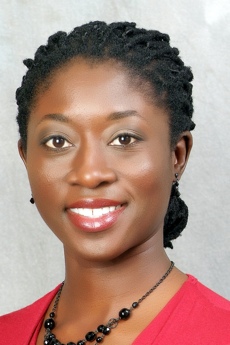
Leslie Ayensu-Coker, MD
- Director, Pediatric & Adolescent Gynecology Fellowship Program
- Director, Oncofertility Program
- Assistant Professor, Division of Pediatric & Adolescent Gynecology, Department of Obstetrics/Gynecology, Pediatrics and Surgery
Cincinnati Children’s Hospital Medical Center
MY GREATEST STRENGTH
My greatest strength is my interpersonal skills. I trust what patients and families tell me, and make sure they feel heard. Listening allows me to address unmet needs like starting an endometriosis support group for patients and families or advocating fertility preservation in cancer patients. Preserving the future fertility of patients is gratifying and fulfilling.
MY INSPIRATION
I was inspired to pursue a career in reproductive endocrinology and gynecology by my medical school mentor, Dr. Karen Bradshaw. Her compassion and genuine care for her patients inspired me to conduct myself in the same fashion. My mentor during my Ob/Gyn residency, Dr. Edward Wallach, taught me how to advocate for the medical residents I teach and the patients I care for. My current division director, Dr. Lesly Breech, exemplifies dedication in a way that challenges me not to be complacent.
HOW I MOTIVATE OTHERS
People respect those who have a passion for what they do. I am committed to the care of my patients, and go above and beyond to meet their needs. In return, my trainees and staff extend themselves beyond their usual talents and skills to help me meet those needs.
OUR GREATEST CHALLENGE
The greatest issues are education and economic disparities. Without education, we fail as a people and when we fail as a people, we fail society. The dilemma is the discrepancy in the education system serving predominantly African-American communities in lower socioeconomic areas. Unfortunately, when educational discrepancies have been addressed, African-American students in these communities continue to lag behind because of economic disparities in the home.
GIVING BACK
I co-lead medical mission trips to Ethiopia and Ghana where specialized care is not readily accessible. Being of Ghanaian descent, this is a special way for me to give back. My division is collaborating with local doctors in Ghana to develop a pediatric and adolescent gynecology center, as there is a lack of medical care for young girls until they become pregnant. Locally, I focus on the prevention of STDs, pregnancy, and infertility to reduce the health disparities in our community. I want black female adolescents to know that I encourage and support them. I make myself available to all of my patients outside of the office in order to cultivate trust and reinforce our clinic discussions.
LESSONS LEARNED
The most important lessons I have learned in the course of my career are (1) to define myself according to my passions and beliefs, and (2) to push myself beyond my comfort zone. I have grown tremendously from seeing many challenging experiences through to completion.
ACHIEVING BALANCE
I have two young children and a husband in graduate school, so balance can be difficult. Destigmatization of flexible work schedules by leadership would greatly improve work-life integration. However, I have accepted that there are times when I need to make the decision to scale back. I have learned what fulfills me, when to say no, and how to conquer the fear of being left behind, knowing that continued success is attainable and that my legacy is in my children and not solely in my professional accomplishments.
CAREER ADVICE
Identify a mentor as early as possible and know that a mentor does not need to be of the same ethnicity or gender. A mentor should be someone who shares similar values and has qualities worth emulating. Many times the best mentor is one who comes about through a natural working relationship in an area of mutual interest.






